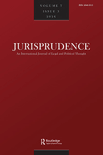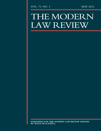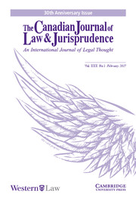
Jurisprudence-An International Journal of Legal and Political Thought
Scope & Guideline
Illuminating Contemporary Issues in Legal and Political Theory
Introduction
Aims and Scopes
- Legal Theory and Philosophy:
The journal explores foundational questions in legal theory, including the nature of law, legal reasoning, and the relationship between law and morality. It emphasizes philosophical inquiries into how laws are interpreted and applied. - Human Rights and Justice:
A significant focus is placed on human rights, transitional justice, and the ethical implications of legal systems. The journal examines the role of law in addressing injustices and promoting social equity. - Constitutional Law and Governance:
The journal addresses constitutional issues, including the dynamics between constitutional and administrative law, and the implications of constitutional rights in contemporary governance. - Pluralism and Legal Interpretation:
There is a consistent exploration of pluralistic approaches to law, including how diverse legal traditions and perspectives influence interpretations and applications within legal systems. - Interdisciplinary Approaches:
The journal incorporates interdisciplinary methodologies, drawing insights from political science, sociology, and ethics to enrich legal discourse and understanding.
Trending and Emerging
- Ethics and Legal Practice:
There is an increasing emphasis on the ethical dimensions of legal practice, particularly how moral considerations influence legal decision-making and the responsibilities of legal professionals. - Transitional Justice and Pluralism:
Recent articles highlight the complexities of transitional justice, especially in pluralistic societies, exploring how diverse legal systems can coexist and address past injustices. - Interdisciplinary Legal Studies:
A growing trend towards interdisciplinary studies is evident, with contributions that integrate insights from sociology, psychology, and political theory to enhance the understanding of legal phenomena. - Artificial Intelligence and Law:
The intersection of technology, particularly artificial intelligence, and its implications for legal processes is emerging as a significant area of inquiry, reflecting contemporary concerns about automation and legal decision-making. - Globalization and Legal Norms:
The impact of globalization on legal norms and practices is increasingly highlighted, with discussions on how international legal frameworks interact with domestic legal systems.
Declining or Waning
- Classical Legal Positivism:
There has been a noticeable decline in discussions centered around classical legal positivism, as newer theoretical frameworks and critiques emerge that challenge its foundational principles. - Traditional Views on Property Law:
Exploration of property law from a traditional standpoint is becoming less frequent, with a shift towards discussing property rights in the context of social justice and equity. - Legal Formalism:
The emphasis on legal formalism is waning, as scholars increasingly critique its limitations and advocate for more flexible, context-sensitive approaches to understanding law. - Historical Legal Analysis:
While historical perspectives on legal theory were once prevalent, there is a declining interest in purely historical analyses without direct relevance to contemporary legal challenges. - Static Conceptions of Rights:
The focus on static and absolute conceptions of rights is diminishing, as there is a growing recognition of the need for dynamic and contextually sensitive interpretations of rights.
Similar Journals

Justicia
Innovating research in law and political science.Justicia, a distinguished academic journal published by UNIV SIMON BOLIVAR, serves as a vital platform for the dissemination of research within the fields of law, political science, and social justice. Since its transition to Open Access in 2014, it has broadened its reach, enabling scholars, practitioners, and students from around the globe to engage with high-quality research unrestricted by subscription barriers. Located in Barranquilla, Colombia, the journal aims to foster interdisciplinary dialogue and innovation by publishing original articles, reviews, and case studies that reflect contemporary legal challenges and social issues. With its commitment to elevating discussions on justice and governance, Justicia plays a crucial role in shaping legal scholarship and influences policy-making, making it an essential resource for anyone dedicated to understanding and contributing to the field.

TEXAS LAW REVIEW
Connecting Theory and Practice in LawTEXAS LAW REVIEW, an esteemed legal journal published by TEXAS LAW REVIEW PUBL INC, stands as a pivotal resource in the field of law, contributing significantly to legal scholarship since its inception. With an ISSN of 0040-4411 and an E-ISSN of 1942-857X, this journal is recognized for its rigorous analysis of pressing legal issues and case law, making it essential reading for legal practitioners, scholars, and students alike. Positioned in the Q2 category for Law (2023), and ranked 343 out of 1025 in the Scopus database, TEXAS LAW REVIEW holds a commendable 66th percentile, highlighting its influence among legal publications. While it does not offer open access, the journal ensures that its high-quality articles are accessible to a wide range of legal audiences. Based in Austin, Texas, the journal's continuous evolution since 1977 reflects its commitment to adapting legal discourse to contemporary challenges, thereby cementing its status as a vital platform for those dedicated to understanding and shaping the legal landscape.

MODERN LAW REVIEW
Connecting Scholars, Practitioners, and Students in Law.MODERN LAW REVIEW, a prestigious academic journal published by Wiley, stands as a significant platform in the field of law, dedicated to exploring contemporary legal issues and fostering scholarly discourse since its inception in 1937. With an impressive Scopus Rank of #237 out of 1025 in the Social Sciences - Law category, placing it in the 76th percentile, the journal has consistently maintained a reputation for high-quality research, currently positioned in Q2 of the category quartiles as of 2023. The journal's comprehensive coverage spans various legal topics, making it essential reading for legal scholars, practitioners, and students alike. Although it is not an open-access journal, its contributions are invaluable for guiding the future of legal scholarship. With a robust history of converged years from 1995, 1997 to 1999, 2001 to 2002, 2004, and 2011 to 2024, MODERN LAW REVIEW remains at the forefront of legal research, addressing pressing issues and influencing legal thought across disciplines.

Cuadernos de Historia del Derecho
Uncovering the Roots of Law.Cuadernos de Historia del Derecho, published by the esteemed Universidad Complutense de Madrid, serves as a vital platform for scholars and practitioners within the field of legal history. This journal, bearing the ISSN 1133-7613 and E-ISSN 1988-2521, focuses on enhancing the understanding of legal developments, practices, and institutions through a rigorous historical lens. While currently not classified as open access, the journal aims to bridge gaps in legal scholarship, providing valuable insights and fostering an academic community dedicated to exploring the evolution of legal systems. With an increasing impact factor attributed to its scholarly contributions, Cuadernos de Historia del Derecho stands out as a key resource for researchers, professionals, and students alike, who are keen on delving into the intricate narratives that have shaped contemporary law. Located in the heart of Madrid, the journal continues to engage a global audience dedicated to the critical analysis of historical legal frameworks.

Revista Brasileira de Direito
Exploring Contemporary Issues in Law and JusticeRevista Brasileira de Direito is a prominent open-access journal dedicated to advancing the field of legal studies in Brazil and beyond. Published by FAC MERIDIONAL-IMED, this journal has been providing a platform for scholarly discussion and research dissemination since its transition to open access in 2013. With an ISSN of 1807-1228 and an E-ISSN of 2238-0604, the Revista Brasileira de Direito focuses on a wide-ranging scope that includes but is not limited to constitutional law, international law, civil rights, and legal theory. This journal is crucial for researchers, legal professionals, and students seeking to stay informed about contemporary legal debates, case studies, and innovative legal solutions. Based in Passo Fundo, Brazil, the journal aims to contribute significantly to the academic landscape by fostering a collaborative environment for the exchange of ideas and critical analyses within the legal community.

COLUMBIA LAW REVIEW
Advancing Legal Thought, Shaping Tomorrow's JusticeCOLUMBIA LAW REVIEW, published by the COLUMBIA JOURNAL TRANSNATIONAL LAW ASSOCIATION, is one of the foremost legal journals in the United States, committed to advancing the discourse on critical legal issues. With an ISSN of 0010-1958 and an E-ISSN of 1945-2268, this prestigious publication has established a strong reputation, reflected in its Q1 rank in Law and a Scopus ranking of #145 out of 1025 journals in the social sciences category, placing it in the 85th percentile. COLUMBIA LAW REVIEW serves as a vital platform for legal scholars, practitioners, and students, publishing notable articles, case studies, and commentaries that influence both academic and practical perspectives on law. With a publication history spanning multiple decades, from its converged years of 1973 to 2024, it remains a key resource for those looking to stay updated on contemporary legal thought and developments. While it operates under a traditional subscription model, the journal’s rigorous peer-review process ensures the highest quality of scholarship in the legal field, solidifying its importance for both emerging and established legal professionals.

NOTRE DAME LAW REVIEW
Pioneering Insights into American LawNOTRE DAME LAW REVIEW is a premier scholarly journal published by Notre Dame Law School, renowned for its rigorous examination and commentary on legal issues and the evolving jurisprudence of the United States. Established in 1926, the journal has become a vital resource for legal scholars, practitioners, and students, consistently earning a reputation for excellence as evidenced by its Q1 category classification in Law for 2023. With a solid ranking within the Scopus Social Sciences index, placing at #413 among 1025 journals, it captures significant contributions to legal scholarship, making it an essential part of any legal researcher's library. Though it does not currently offer open access options, the journal's impact is underscored by its rich history and commitment to advancing legal discourse. Scholars looking to stay abreast of the latest legal developments and analyses will find NOTRE DAME LAW REVIEW an indispensable tool for their research and practice.

Revista de Derecho Civil
Advancing Civil Law Discourse GloballyRevista de Derecho Civil is a distinguished academic journal dedicated to the field of civil law, published by NOTYREG HISPANIA in Spain. With an ISSN of 2341-2216 and E-ISSN of 2341-2216, it has established itself as an essential platform for scholarly discourse since gaining Open Access status in 2014, thereby ensuring a wider dissemination of knowledge and increased accessibility for researchers and practitioners alike. The journal has been recognized in the Q2 category in the field of Law for 2023, reflecting its contribution to the academic community and competitive standing within the discipline, evidenced by its Scopus rank of 683 out of 1025 in the Social Sciences and Law category. Covering a wide range of topics and converging from 2018 to 2024, Revista de Derecho Civil invites contributions from legal scholars globally, fostering an environment that promotes in-depth analysis, critical thought, and innovative research in civil law. As such, it holds an important place for students, researchers, and professionals aiming to engage with contemporary legal issues and doctrines.

Islamic Law and Society
Bridging Tradition and Modernity in Legal DiscourseIslamic Law and Society, published by BRILL, is a distinguished academic journal that has been bridging the gap between legal studies and socio-political discourse since its inception in 1994. With an ISSN of 0928-9380 and an E-ISSN of 1568-5195, the journal is recognized for its scholarly contributions in the fields of Law, Sociology, and Political Science, boasting a notable impact factor that positions it within the Q2 category in Law and Q3 in Sociology and Political Science as of 2023. Situated in the Netherlands, it is committed to publishing high-quality, peer-reviewed research that explores the intricate relationship between Islamic legal traditions and contemporary societal issues. The journal's indexed rankings in Scopus reflect its relevance, ranking #502 out of 1025 in Law and #844 out of 1466 in Sociology and Political Science. This makes it an essential resource for researchers, professionals, and students seeking to gain insights into the complexities of Islamic law within global contexts. The journal is accessible through various academic databases, offering a platform for interdisciplinary engagement and research dissemination, crucial for those invested in the dynamics of law and society.

Canadian Journal of Law and Jurisprudence
Decoding Legal Complexity Through Canadian PerspectivesCanadian Journal of Law and Jurisprudence, published by Cambridge University Press, serves as a pivotal platform in the field of legal studies, particularly recognized for its comprehensive exploration of jurisprudence in the context of Canadian law. While the journal operates without an open access model, its ISSN 0841-8209 and E-ISSN 2056-4260 ensure broad academic accessibility. Based in the United Kingdom, it has established a notable impact within its category, maintaining a Q3 ranking in Law according to the latest 2023 metrics. With its convergence of issues from 1996 to 2003, periods in 2007, and recently from 2012 to 2024, the journal embraces a rich historical context while addressing contemporary legal challenges. Ranked #439 out of 1025 in the social sciences category on Scopus, the journal is positioned within the 57th percentile, highlighting its significance and influence in legal scholarship. Aimed at researchers, professionals, and students, the Canadian Journal of Law and Jurisprudence is an essential resource for those seeking to deepen their understanding of the evolving landscape of law and its philosophical underpinnings.